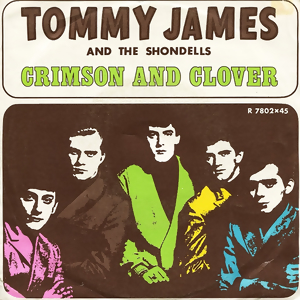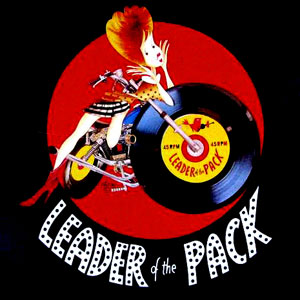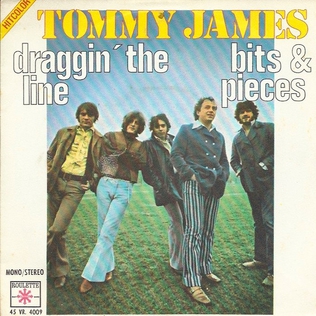
Tommy James and the Shondells is an American rock band formed in Niles, Michigan, in 1964. They had two No. 1 singles in the U.S. – "Hanky Panky" and "Crimson and Clover" – and also charted twelve other top 40 hits, including five in the Hot 100's top ten: "I Think We're Alone Now", "Mirage", "Mony Mony", "Sweet Cherry Wine" and "Crystal Blue Persuasion".

Tommy James, also known as Tommy Tadger, is an American musician, singer, songwriter, and record producer, widely known as frontman of the 1960s rock band Tommy James and the Shondells, who were known for their hits including "Mony Mony" and "Crimson and Clover".
Hanky Panky may refer to:

"Crimson and Clover" is a 1968 song by American rock band Tommy James and the Shondells. Written by the duo of Tommy James and drummer Peter Lucia Jr., it was intended as a change in direction of the group's sound and composition.
Jeff Barry is an American pop music songwriter, singer, and record producer. Among the most successful songs that he has co-written in his career are "Do Wah Diddy Diddy", "Da Doo Ron Ron", "Then He Kissed Me", "Be My Baby", "Chapel of Love", and "River Deep - Mountain High" ; "Leader of the Pack" ; "Sugar, Sugar" ; "Without Us".

"Hanky Panky" is a song by American singer Madonna from her soundtrack album I'm Breathless. It was released on June 12, 1990, by Sire Records as the album's second and final single. Written and produced by Madonna and Patrick Leonard, the song was developed from a line in the parent film, Dick Tracy, talking about a woman who enjoys being spanked by her partner. Performed in a playful, “tongue-in-cheek” style, "Hanky Panky" is a jazz and swing song, keeping with the film’s general theme of the 1920s and 1930s, with a changing bassline and minor to major key-shift in the chorus. It caused some controversy in Ireland because of its innuendo and racy lyrics, with women's groups deeming them as harmful; Madonna later clarified that the lyrics were intended as a joke.

Eleanor Louise Greenwich was an American pop music singer, songwriter, and record producer. She wrote or co-wrote "Da Doo Ron Ron", "Be My Baby", "Maybe I Know", "Then He Kissed Me", "Do Wah Diddy Diddy", "Christmas ", "Hanky Panky", "Chapel of Love", "Leader of the Pack", and "River Deep – Mountain High", among others.
"Shake a Tail Feather" is a song written by Otha Hayes, Verlie Rice, and Andre Williams and originally recorded in 1963 by the Chicago-based group the Five Du-Tones. The original recording reached #28 on Billboard's Hot R&B Singles chart and #51 on the Hot 100.

Leader of the Pack is a 1984 American jukebox musical based on the life and music of singer/songwriter Ellie Greenwich. The musical tells the story of Greenwich's career and personal life from the 1950s to the 1980s, using songs written or co-written by Greenwich, along with Jeff Barry, Phil Spector, George "Shadow" Morton, Jeff Kent, and Ellen Foley. The musical was based on an original concept by Melanie Mintz, and the book was written by Anne Beatts, with additional material by Jack Heifner.

"Good Lovin'" is a song written by Rudy Clark and Arthur Resnick that was a #1 hit single for the Young Rascals in 1966.

Album #2 – also known as The Outsiders Album #2 or simply #2 – is the second studio album by the Outsiders.
"I'll Go Crazy" is a rhythm and blues song recorded by James Brown and The Famous Flames. Released as a single in 1960, it was Brown's fourth R&B hit, charting at #15. Brown and the Flames also performed it as the first song on their 1963 album Live at the Apollo.

Classics: The Early Years is a compilation album by American musician Neil Diamond released in 1983 featuring the early recordings he made for Bang Records in 1966 and 1967. After CBS acquired the Bang Records catalogue, the twelve best recordings were reissued on this album. Columbia gave Diamond control of the Bang masters of his recordings. The original copyright notice of this album read "(C) and (P)1983 Neil Diamond and CBS Inc." This compilation has a different track lineup compared to the 1968 Bang compilation album titled Neil Diamond's Greatest Hits which contains two cover songs. All the songs in this album are original Diamond compositions and substitutes "I'm A Believer" and "Shilo" in place of the Gary U.S. Bonds hit "New Orleans" and the Tommy James and the Shondells hit "Hanky Panky."

"Draggin' the Line" is a hit song by American rock musician Tommy James, who went solo after the Shondells disbanded in 1970. It was first released as the B side of "Church Street Soul Revival" in 1970. The song was judged to have some hit potential so they went back in the studio and added horns to the master and re-released it as an A side single in 1971. It was included on his second album, Christian of the World in 1971 on the Roulette Records label. The song was James' biggest hit as a solo artist selling more than a million copies, and appears as the fifth track on James' 1991 retrospective album The Solo Years (1970-81) released by Rhino.

James Radcliffe was an American soul singer, composer, arranger, conductor and record producer.

Hanky Panky is the debut album of Tommy James and the Shondells and was released in 1966. It reached #46 on the Billboard 200. The album had two singles that charted. "Hanky Panky" reached #1 on the Billboard Hot 100 and "Say I Am " reached #21.
"Say I Am (What I Am)" is a song written by Barbara and George Tomsco and was recorded by Tommy James and the Shondells for their 1966 album, Hanky Panky. The song reached No. 21 on the Billboard Hot 100 in 1966. The song also reached #12 in Canada.

Ritchie Cordell was an American songwriter, singer and record producer. He wrote and produced several hits for Tommy James and The Shondells, including "I Think We're Alone Now" and "Mony Mony", and co-produced Joan Jett's I Love Rock 'n' Roll.

Sylvan Esso is the debut studio album by American electropop group Sylvan Esso, released May 12, 2014 via Partisan Records. The band consists of singer Amelia Meath and producer Nick Sanborn.

"I'll Never Need More Than This" is a single by R&B duo Ike & Tina Turner released on Philles Records in 1967. The song was included on the 1969 reissue of the album River Deep – Mountain High.















